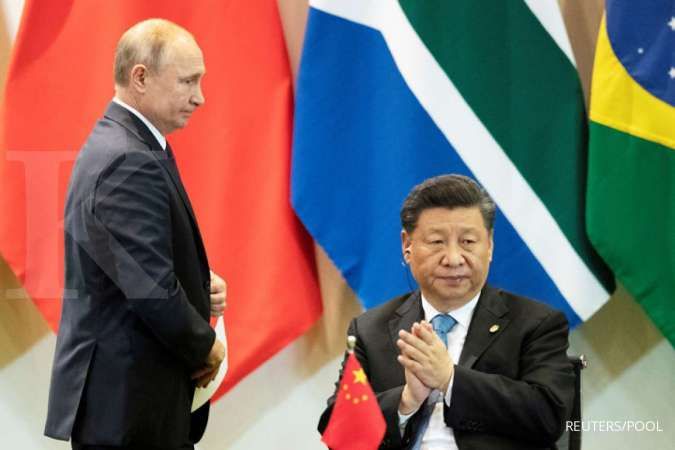KNews.id – Katsuji Nakazawa is a Tokyo-based senior staff and editorial writer at Nikkei. He spent seven years in China as a correspondent and later as China bureau chief. He was the 2014 recipient of the Vaughn-Ueda International Journalist prize.
The affairs that motivate political decisions can sometimes be too dramatic or bizarre to believe.
China’s sudden and mysterious purge of foreign minister Qin Gang this summer was likely triggered by a tip-off from Moscow, sources familiar with China-Russia relations have revealed.
“Qin Gang became the first victim of the informational warfare that reflects a discord between China and Russia,” one source said. “The issue is very deep.”
Qin was suddenly removed from his post at the end of July. This was an important incident that impacted the international political dynamics related to Russia’s Ukraine invasion, the source said. The dismissal was also carried out as a precaution of sorts ahead of the summit between Chinese President Xi Jinping and his U.S. counterpart Joe Biden in the U.S. in November.
It is a complicated political drama in which China and Russia share the lead role, with the U.S. appearing as a supporting character.
It all began in late May when a delegation led by Li Hui, a former Chinese ambassador to Russia, visited Ukraine and met with President Volodymyr Zelenskyy. The meeting indicated that Beijing was starting to shift its posture toward the Russia-Ukraine war.
Li currently serves as the Chinese government’s special representative for Eurasian affairs.
It is important to note that Li’s mission took place when Ukraine was riding strong momentum toward launching a counteroffensive against invading Russian forces.
Immediately after meeting with the Chinese delegation in Kyiv, Zelenskyy headed to Hiroshima, Japan, for the Group of Seven summit. His plane, borrowed from the French government, had to fly a considerable distance over mainland China.
It is natural to conclude that the French government obtained advance permission from Beijing. Gaining approval from China, which influences Russia, was important if France was to prevent the aircraft from being obstructed by Russian military jets and ensure Zelenskyy would arrive safely in Japan.
As for China, it would have wanted to cooperate in ensuring Zelenskyy’s safety as it had just begun moving to mediate between Ukraine and Russia.
During the G7 summit, Zelenskyy lashed out at Russia and appealed to the international community for support.
He also toured the Hiroshima Peace Memorial Museum accompanied by Japanese Prime Minister Fumio Kishida. Full of vigor, Zelenskyy made a strong impression.
Russia was likely frustrated that the global political landscape was shifting, perhaps even fearful that China was giving the impression that it was supporting the Ukrainian leader in the name of mediating peace.
Xi had visited Russia in late March to meet President Vladimir Putin. It was Xi’s first trip to a foreign country since he secured an unprecedented third term as China’s top leader in October 2022. And both leaders likely wanted to show off their camaraderie.
But less than two months later the Chinese diplomatic delegation arrived in Ukraine, obviously against Russia’s wishes. At this point, Moscow must have at least suspected that China, a reliable ally, was changing its basic stance on the war.
Regardless, China-Russia relations grew more strained than outsiders might imagine, with Russia finally taking a big gamble: It would drop an informational bomb on Beijing. The subject of that information was then Foreign Minister Qin, who had been tapped for the post by Xi.
It’s easy to see what might have motivated Russia. Being China’s top diplomat, Qin would have been the person responsible for sending the Chinese delegation to Ukraine.
Russia labeled Qin as pro-U.S. as he had served as ambassador to the U.S. for a short period before being tapped as foreign minister. So it “passed on internal information to Beijing’s upper echelons that Qin was strongly suspected to be a spy for the U.S.,” another source familiar with China-Russia relations said. The tip-off likely came with some “evidence,” this source added.
May and June was a terrible time for Russia. In June, Wagner, a Russian private military organization led by the late Yevgeny Prigozhin, launched a short-lived rebellion against the country’s military establishment. Prigozhin, who should have been one of Putin’s closest aides, died in a plane crash in August.
The June 23-24 mutiny took place right before Russian Deputy Foreign Minister Andrei Rudenko made a surprise visit to China.
Rudenko met with Qin on June 25. It would be Qin’s last public appearance as foreign minister, and he would be removed from that post one month later.
What “evidence” did Russia present to China?
Most likely, it had to do with Qin’s extramarital affair with a high-profile Chinese TV presenter.
The affair, revealed to the world by Western media after Qin’s dismissal, attracted tremendous attention. According to reports, Qin had a child with the TV presenter with the help of a surrogate mother in the U.S.
Russia focused on this scandal as well as on the woman, who had lived in the U.K. and U.S.
After Qin’s disappearance, China quickly returned to its pro-Moscow stance in terms of Russia’s invasion of Ukraine. China also stopped publicly expressing its intention to mediate a ceasefire between Russia and Ukraine.
In a likely sign of appreciation for Beijing’s change of heart, Putin visited China in October to attend an international conference marking the 10th anniversary of Xi’s pet Belt and Road Initiative.
On the surface, it looks like China-Russia relations, including military cooperation, are back on track. But careful observations of the fierce tug-of-war that played out during the past six months show their second honeymoon is not all bliss and euphoria.
With the eyes of the world currently fixed on the war between Israel and Hamas, Russia’s war on Ukraine is not drawing as much attention as it used to. For Russia, this is a welcome turn of events.
Earlier this month, likely seeing that the timing was finally right, Putin declared his candidacy for Russia’s presidential election in March.
But it remains unclear why China accepted Russia’s assertion, which can be seen as interference in its internal affairs. It is not uncommon for senior Chinese officials to have extramarital affairs. But there are not many cases of officials being dismissed for such transgressions.
In Qin’s case, though, Beijing likely followed up on Russia’s tip and found serious issues that went well beyond a mere love affair.
Because it was also related to China-U.S. relations, the scandal eventually exploded within the Chinese Communist Party. China attaches greater importance to its ties with the U.S. than it does to those with any other country.
Armed with the information from Russia, China’s upper echelons could not help but think Qin’s lover might have passed intelligence regarding domestic political issues to Washington. If this did indeed occur, it could severely damage Xi’s reputation.
Qin once served as director of the Chinese Foreign Ministry’s Protocol Department. He always accompanied Xi to diplomatic events at home and abroad.
He was tapped as China’s ambassador to the U.S. and then, at the unusually young age of 57, as its foreign minister. This helped Qin be seen as Xi’s close aide.
Qin is also believed to have been familiar with aspects of Xi’s private life, and Xi’s closest aides likely thought they could not afford to retain Qin ahead of the U.S.-China summit.
The Qin issue is so grave that it cannot be talked about frankly even within the party. Party leaders are under a strict gag order and the internal explanation to other senior party members was vague, citing a “lifestyle-related issue,” which implies an extramarital affair or similar matter.
This explanation was far from the core part of the issue. In October, with the U.S.-China summit around the corner, Qin was also removed as state councilor, a vice premier-level post he had concurrently held. The focus now is whether the party will severely punish him, or build a criminal case against him.
Russia’s informational salvo had the power to wipe out China’s top diplomat and turn the global political tide in its favor. It also affected China’s stance toward the U.S. and eventually developed into a serious domestic political issue in China.
The full details of this complicated drama, however, will never be truly revealed or made known to the world. (Zs/NA)








